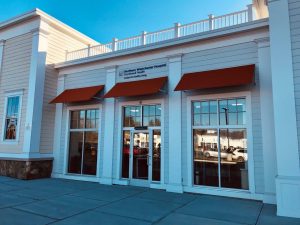NWH Offers Antibody Tests to First Responders, Essential Workers

Northern Westchester Hospital (NWH) is offering serology COVID-19 antibody testing at two locations for first responders and other essential workers who live or work in Armonk, Bedford, Chappaqua, Lewisboro, Mount Kisco, Pleasantville, Somers, North Salem, Yorktown or Pound Ridge.
NWH anticipates that testing for the general public will begin by early June.
In compliance with state Department of Health guidelines, effective now through May 29, antibody testing will be administered Monday through Friday between 8 a.m. and noon or from 2 to 6 p.m. for first responders and essential workers who preregister. Testing is done at the Center for Healthy Living next to Whole Foods at Chappaqua Crossing or at the hospital’s main campus at 400 E. Main St. in Mount Kisco.
There will be no testing on Memorial Day, Monday, May 25.
Antibody testing is available to the following priority groups:
–Animal care workers (such as veterinarians; automotive service and repair workers)
–Bank tellers/workers and building code enforcement officers
–Correction, parole and probation officers; child care workers; client-facing case managers and coordinators; and counselors (such as mental health, addiction, youth, vocational, crisis, etc.)
–Delivery workers, dentists and dental hygienists direct care providers
–Essential construction workers at occupied residences or buildings
–Faith-based leaders (e.g. chaplains, clergy); field investigators or regulators for health and safety; firefighters; food service workers and grocery store workers; and funeral home workers
–Healthcare practitioners, professionals, aides and support staff (such as physicians, nurses, public health personnel); human services providers; hotel/motel workers; laundry and workers at dry cleaners
–Mail and shipping workers; maintenance and janitorial/cleaning workers; and medical specialists, nutritionists and dietitians
–Occupational, physical, recreational and speech therapists and optometrists and opticians and supporting staff
–Paramedics and EMTs, police officers and psychologists and psychiatrists
–Residential care program managers; retail workers at essential businesses such as grocery stores, pharmacies, convenience stores, gas stations and hardware stores
–Security guards and personnel, shelter workers and homelessness support staff and social workers
–Teachers, professors and educators; transit workers (including those at airports, railways, buses and for-hire vehicles and trash and recycling workers
–Utility workers
“While we recognize that many people want this test, it is important for us to prioritize resources to meet the most urgent public health need,” said Dr. Marla Koroly, NWH’s senior vice president for medical affairs and chief medical officer. “We fully expect to meet the demand in our communities as we continue to roll out testing beyond this priority group. Efforts to expand testing are critical to help scientists better understand how COVID-19 travels from person to person, why it affects people differently, whether the virus is seasonal like the flu and if people can be re-infected.”
Serology or antibody testing is conducted with a simple blood draw to determine whether people who have been previously infected or exposed to COVID-19 have antibodies – proteins in the blood produced by the body’s immune system – that help fight infection.
Antibody testing does not diagnose COVID-19 infection, but a negative result means the absence of COVID-19 antibodies in the blood. Most commonly, this indicates someone has not been infected with the COVID-19 virus, but it does not rule-out early or recent infection. A positive result indicates a person has been exposed to COVID-19 and developed antibodies in their blood. At this point scientists are not sure how detected antibodies impact immunity and protect against re-infection.
Regardless of test results, it is essential for people to adhere to the governor’s executive order and the state Department of Health guidelines for masking, social distancing and hand washing.
Testing updates will be posted on the NWH website at www.nwhc.net. People may opt to receive notifications by signing up for the hospital’s e-newsletter on the website’s home page or by following NWH on social media.
Pre-registration for testing can be completed at https://bit.ly/3dFyuSG and participants will receive a confirmation email after successful preregistration.
Please be sure to bring the following items to your appointment: proof of identification, proof of employment in one of the priority groups and a copy of your insurance card (co-payments are waived). Please know that your temperature will be taken upon entry, per New York State regulations.

Examiner Media – Keeping you informed with professionally-reported local news, features, and sports coverage.
